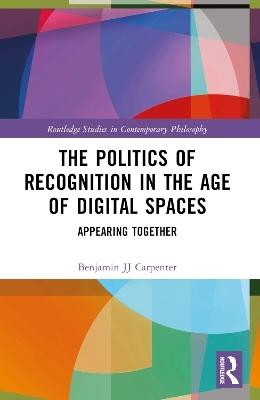
The Politics of Recognition in the Age of Digital Spaces
Appearing Together
Seiten
2024
Routledge (Verlag)
978-1-032-53903-4 (ISBN)
Routledge (Verlag)
978-1-032-53903-4 (ISBN)
- Lieferbar (Termin unbekannt)
- Versandkostenfrei innerhalb Deutschlands
- Auch auf Rechnung
- Verfügbarkeit in der Filiale vor Ort prüfen
- Artikel merken
This book provides a philosophical analysis of the notion of selfhood that underlies identity politics. It offers a unique theory of the self that combines previous scholarly work on recognition and the phenomenology of space.
The politics of identity occupy the centre of a contested terrain. Marginalised and oppressed peoples continue to seek the transformation of our shared social world and our political institutions required for their lives to be liveable. Public criticism and academic treatments of identity politics often take a disparaging view that treats it as subordinate to more general political questions about justice and the organisation of society and its institutions. This book argues that these polemics ignore the numerous ways in which all politics is concerned with matters of selfhood and identity. Through a rereading of Hegel’s account of recognition as an ongoing and dynamic process that constitutes the self, it presents selves—and the categories of identity that qualify these selves—as fundamentally conditioned by the environments in which they appear before themselves and others. It also argues that we do the work of identity in public spaces—particularly digital spaces—and that these spaces shape what identities we can assume and what those identities mean. Contemporary social media technologies facilitate the production of particular forms of selfhood through the combined logics of the interface, the profile, and the post.
The Politics of Recognition in the Age of Digital Spaces will be of interest to scholars and advanced students working in a wide range of disciplines including political philosophy, phenomenology, philosophy of technology, sociology, political theory, and critical theory. It will also appeal to anyone with an interest in contemporary identity politics, whether as a matter of study or lived experience.
The politics of identity occupy the centre of a contested terrain. Marginalised and oppressed peoples continue to seek the transformation of our shared social world and our political institutions required for their lives to be liveable. Public criticism and academic treatments of identity politics often take a disparaging view that treats it as subordinate to more general political questions about justice and the organisation of society and its institutions. This book argues that these polemics ignore the numerous ways in which all politics is concerned with matters of selfhood and identity. Through a rereading of Hegel’s account of recognition as an ongoing and dynamic process that constitutes the self, it presents selves—and the categories of identity that qualify these selves—as fundamentally conditioned by the environments in which they appear before themselves and others. It also argues that we do the work of identity in public spaces—particularly digital spaces—and that these spaces shape what identities we can assume and what those identities mean. Contemporary social media technologies facilitate the production of particular forms of selfhood through the combined logics of the interface, the profile, and the post.
The Politics of Recognition in the Age of Digital Spaces will be of interest to scholars and advanced students working in a wide range of disciplines including political philosophy, phenomenology, philosophy of technology, sociology, political theory, and critical theory. It will also appeal to anyone with an interest in contemporary identity politics, whether as a matter of study or lived experience.
Benjamin JJ Carpenter is a Visiting Fellow in the School of Politics, Philosophy, Language and Communication Studies at the University of East Anglia, UK. His current research focuses on identity, spatiality, and internet communication technologies.
Introduction: The Vampire’s Masquerade 1. Pathology and Mediation 2. The Dialectical Self and Subject 3. Rejecting Recognition: Responding to Critiques of the Recognitive Tradition 4. The Structuring of Public Space 5. Online Discourses of the Self: The Spatiality of Social Media and the Framing of the Online Persona Conclusion: Against the Enclosure of Identity Post-script: Flight into the Virtual
| Erscheinungsdatum | 04.10.2023 |
|---|---|
| Reihe/Serie | Routledge Studies in Contemporary Philosophy |
| Verlagsort | London |
| Sprache | englisch |
| Maße | 152 x 229 mm |
| Themenwelt | Geisteswissenschaften ► Philosophie ► Geschichte der Philosophie |
| Geisteswissenschaften ► Philosophie ► Philosophie der Neuzeit | |
| ISBN-10 | 1-032-53903-8 / 1032539038 |
| ISBN-13 | 978-1-032-53903-4 / 9781032539034 |
| Zustand | Neuware |
| Haben Sie eine Frage zum Produkt? |
Mehr entdecken
aus dem Bereich
aus dem Bereich
die kolonialen Wurzeln der französischen Theorie
Buch | Hardcover (2024)
Matthes & Seitz Berlin (Verlag)
28,00 €
oder Das Leben Montaignes in einer Frage und zwanzig Antworten
Buch | Softcover (2023)
C.H.Beck (Verlag)
18,00 €


